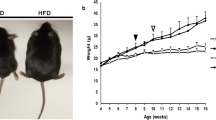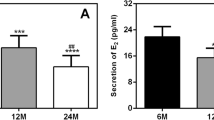Abstract
Ovarian aging is one of the main causes of female infertility, and its molecular background is still largely unknown. As DNA methylation regulates many oogenesis/folliculogenesis-related genes, the expression levels and cellular localizations of DNA methyltransferases (DNMTs) playing key roles in this process is important in the ovaries from early to aged terms. In the present study, we aimed to evaluate the spatial and temporal expression of the Dnmt1, Dnmt3a, Dnmt3b, and Dnmt3l genes as well as global DNA methylation levels in the mouse ovaries during aging. For this purpose, the following groups were created: young (1- and 2-week old; n = 3 from each week), prepubertal (3- and 4-week-old; n = 3 from each week), pubertal (5- and 6-week-old; n = 3 from each week), postpubertal (16- and 18-week-old; n = 3 from each week), and aged (52-, 60- and 72-week-old; n = 3 from each week). We found here that Dnmt1, Dnmt3a, and Dnmt3l genes’ expression at mRNA and protein levels as well as global DNA methylation profiles were gradually and significantly decreased in the postnatal ovaries from young to aged groups (P < 0.05). In contrast, there was a remarkable increase of Dnmt3b expression in the pubertal, postpubertal and aged groups (P < 0.05). Our findings suggest that the significantly altered DNMT expression and global DNA methylation levels during ovarian aging may contribute to female infertility development at the later terms of lifespan. Also, new researches are required to determine the molecular biological mechanism(s) that how altered DNMT expression and decreased DNA methylation lead to ovarian aging.









Similar content being viewed by others
References
Barau J, Teissandier A, Zamudio N, Roy S, Nalesso V, Herault Y, Guillou F, Bourc'his D (2016) The DNA methyltransferase DNMT3C protects male germ cells from transposon activity. Science 354(6314):909–912. https://doi.org/10.1126/science.aah5143
Ben-Or S (1963) Morphological and functional development of the ovary of the mouse. I. Morphology and histochemistry of the developing ovary in normal conditions and after FSH treatment. J Embryol Exp Morphol 11:1–11
Berkowitz GS, Skovron ML, Lapinski RH, Berkowitz RL (1990) Delayed childbearing and the outcome of pregnancy. N Engl J Med 322(10):659–664. https://doi.org/10.1056/NEJM199003083221004
Bird A (1992) The essentials of DNA methylation. Cell 70(1):5–8. https://doi.org/10.1016/0092-8674(92)90526-i
Bird A, Tate P, Nan X, Campoy J, Meehan R, Cross S, Tweedie S, Charlton J, Macleod D (1995) Studies of DNA methylation in animals. J Cell Sci Suppl 19:37–39
Challen GA, Sun D, Mayle A, Jeong M, Luo M, Rodriguez B, Mallaney C, Celik H, Yang L, Xia Z, Cullen S, Berg J, Zheng Y, Darlington GJ, Li W, Goodell MA (2014) Dnmt3a and Dnmt3b have overlapping and distinct functions in hematopoietic stem cells. Cell Stem Cell 15(3):350–364. https://doi.org/10.1016/j.stem.2014.06.018
Cnattingius S, Forman MR, Berendes HW, Isotalo L (1992) Delayed childbearing and risk of adverse perinatal outcome. A population-based study. JAMA 268(7):886–890
de Bruin JP, Dorland M, Spek ER, Posthuma G, van Haaften M, Looman CW, te Velde ER (2004) Age-related changes in the ultrastructure of the resting follicle pool in human ovaries. Biol Reprod 70(2):419–424. https://doi.org/10.1095/biolreprod.103.015784
Deplus R, Brenner C, Burgers WA, Putmans P, Kouzarides T, de Launoit Y, Fuks F (2002) Dnmt3L is a transcriptional repressor that recruits histone deacetylase. Nucleic Acids Res 30(17):3831–3838. https://doi.org/10.1093/nar/gkf509
Eichenlaub-Ritter U, Boll I (1989) Nocodazole sensitivity, age-related aneuploidy, and alterations in the cell cycle during maturation of mouse oocytes. Cytogenet Cell Genet 52(3–4):170–176. https://doi.org/10.1159/000132871
Eichenlaub-Ritter U, Vogt E, Yin H, Gosden R (2004) Spindles, mitochondria and redox potential in ageing oocytes. Reprod Biomed Online 8(1):45–58
Fatemi M, Hermann A, Gowher H, Jeltsch A (2002) Dnmt3a and Dnmt1 functionally cooperate during de novo methylation of DNA. Eur J Biochem 269(20):4981–4984. https://doi.org/10.1046/j.1432-1033.2002.03198.x
Flurkey K, Gee DM, Sinha YN, Wisner JR Jr, Finch CE (1982) Age effects on luteinizing hormone, progesterone and prolactin in proestrous and acyclic C57BL/6j mice. Biol Reprod 26(5):835–846. https://doi.org/10.1095/biolreprod26.5.835
Gagliardi M, Strazzullo M, Matarazzo MR (2018) DNMT3B functions: novel insights from human disease. Front Cell Dev Biol 6:140. https://doi.org/10.3389/fcell.2018.00140
Goll MG, Kirpekar F, Maggert KA, Yoder JA, Hsieh CL, Zhang X, Golic KG, Jacobsen SE, Bestor TH (2006) Methylation of tRNAAsp by the DNA methyltransferase homolog Dnmt2. Science 311(5759):395–398. https://doi.org/10.1126/science.1120976
Gosden RG, Laing SC, Felicio LS, Nelson JF, Finch CE (1983) Imminent oocyte exhaustion and reduced follicular recruitment mark the transition to acyclicity in aging C57BL/6J mice. Biol Reprod 28(2):255–260. https://doi.org/10.1095/biolreprod28.2.255
Hamatani T, Falco G, Carter MG, Akutsu H, Stagg CA, Sharov AA, Dudekula DB, VanBuren V, Ko MS (2004) Age-associated alteration of gene expression patterns in mouse oocytes. Hum Mol Genet 13(19):2263–2278. https://doi.org/10.1093/hmg/ddh241
Holinka CF, Tseng YC, Finch CE (1979) Reproductive aging in C57BL/6J mice: plasma progesterone, viable embryos and resorption frequency throughout pregnancy. Biol Reprod 20(5):1201–1211. https://doi.org/10.1095/biolreprod20.5.1201
Hunt PA, Hassold TJ (2008) Human female meiosis: what makes a good egg go bad? Trends Genet 24(2):86–93. https://doi.org/10.1016/j.tig.2007.11.010
Huntriss J, Hinkins M, Oliver B, Harris SE, Beazley JC, Rutherford AJ, Gosden RG, Lanzendorf SE, Picton HM (2004) Expression of mRNAs for DNA methyltransferases and methyl-CpG-binding proteins in the human female germ line, preimplantation embryos, and embryonic stem cells. Mol Reprod Dev 67(3):323–336. https://doi.org/10.1002/mrd.20030
Kaneda M, Okano M, Hata K, Sado T, Tsujimoto N, Li E, Sasaki H (2004) Essential role for de novo DNA methyltransferase Dnmt3a in paternal and maternal imprinting. Nature 429(6994):900–903. https://doi.org/10.1038/nature02633
Li Q, Cai M, Wang J, Gao Q, Guo X, Jia X, Xu S, Zhu H (2020) Decreased ovarian function and autophagy gene methylation in aging rats. J Ovarian Res 13(1):12. https://doi.org/10.1186/s13048-020-0615-0
Liao J, Karnik R, Gu H, Ziller MJ, Clement K, Tsankov AM, Akopian V, Gifford CA, Donaghey J, Galonska C, Pop R, Reyon D, Tsai SQ, Mallard W, Joung JK, Rinn JL, Gnirke A, Meissner A (2015) Targeted disruption of DNMT1, DNMT3A and DNMT3B in human embryonic stem cells. Nat Genet 47(5):469–478. https://doi.org/10.1038/ng.3258
Margot JB, Ehrenhofer-Murray AE, Leonhardt H (2003) Interactions within the mammalian DNA methyltransferase family. BMC Mol Biol 4:7. https://doi.org/10.1186/1471-2199-4-7
May-Panloup P, Boucret L, Chao de la Barca JM, Desquiret-Dumas V, Ferre-L'Hotellier V, Moriniere C, Descamps P, Procaccio V, Reynier P (2016) Ovarian ageing: the role of mitochondria in oocytes and follicles. Hum Reprod Update 22(6):725–743. https://doi.org/10.1093/humupd/dmw028
Navot D, Drews MR, Bergh PA, Guzman I, Karstaedt A, Scott RT Jr, Garrisi GJ, Hofmann GE (1994) Age-related decline in female fertility is not due to diminished capacity of the uterus to sustain embryo implantation. Fertil Steril 61(1):97–101. https://doi.org/10.1016/s0015-0282(16)56459-0
Nelson JF, Felicio LS, Osterburg HH, Finch CE (1981) Altered profiles of estradiol and progesterone associated with prolonged estrous cycles and persistent vaginal cornification in aging C57BL/6J mice. Biol Reprod 24(4):784–794. https://doi.org/10.1095/biolreprod24.4.784
Ozturk S, Sozen B, Demir N (2015) Epab and Pabpc1 are differentially expressed in the postnatal mouse ovaries. J Assist Reprod Genet 32(1):137–146. https://doi.org/10.1007/s10815-014-0362-5
Paczkowski M, Schoolcraft WB, Krisher RL (2015) Dysregulation of methylation and expression of imprinted genes in oocytes and reproductive tissues in mice of advanced maternal age. J Assist Reprod Genet 32(5):713–723. https://doi.org/10.1007/s10815-015-0463-9
Peters H (1969) The development of the mouse ovary from birth to maturity. Acta Endocrinol (Copenh) 62(1):98–116. https://doi.org/10.1530/acta.0.0620098
Roberts CL, Algert CS, March LM (1994) Delayed childbearing–are there any risks? Med J Aust 160(9):539–544
Saitou M, Kagiwada S, Kurimoto K (2012) Epigenetic reprogramming in mouse pre-implantation development and primordial germ cells. Development 139(1):15–31. https://doi.org/10.1242/dev.050849
Sauer MV (1998) The impact of age on reproductive potential: lessons learned from oocyte donation. Maturitas 30(2):221–225
Smallwood SA, Kelsey G (2012) De novo DNA methylation: a germ cell perspective. Trends Genet 28(1):33–42. https://doi.org/10.1016/j.tig.2011.09.004
Tarin JJ, Perez-Albala S, Cano A (2001) Cellular and morphological traits of oocytes retrieved from aging mice after exogenous ovarian stimulation. Biol Reprod 65(1):141–150. https://doi.org/10.1095/biolreprod65.1.141
Turek-Plewa J, Jagodzinski PP (2005) The role of mammalian DNA methyltransferases in the regulation of gene expression. Cell Mol Biol Lett 10(4):631–647
Uysal F, Ozturk S (2017) DNA Methyltransferases in Mammalian Oocytes. Results Probl Cell Differ 63:211–222. https://doi.org/10.1007/978-3-319-60855-6_10
Uysal F, Akkoyunlu G, Ozturk S (2015) Dynamic expression of DNA methyltransferases (DNMTs) in oocytes and early embryos. Biochimie 116:103–113. https://doi.org/10.1016/j.biochi.2015.06.019
Xi X, Zou Q, Wei Y, Chen Y, Wang X, Lv D, Li P, Wen A, Zhu L, Tang G, Ma J, Li M, Li X, Jiang Y (2019) Dynamic changes of DNA methylation and transcriptome expression in porcine ovaries during aging. Biomed Res Int 2019:8732023. https://doi.org/10.1155/2019/8732023
Yamaguchi S, Shen L, Liu Y, Sendler D, Zhang Y (2013) Role of Tet1 in erasure of genomic imprinting. Nature 504(7480):460–464. https://doi.org/10.1038/nature12805
Yang X, Smith SL, Tian XC, Lewin HA, Renard JP, Wakayama T (2007) Nuclear reprogramming of cloned embryos and its implications for therapeutic cloning. Nat Genet 39(3):295–302. https://doi.org/10.1038/ng1973
Yue MX, Fu XW, Zhou GB, Hou YP, Du M, Wang L, Zhu SE (2012) Abnormal DNA methylation in oocytes could be associated with a decrease in reproductive potential in old mice. J Assist Reprod Genet 29(7):643–650. https://doi.org/10.1007/s10815-012-9780-4
Zhang X, Yazaki J, Sundaresan A, Cokus S, Chan SW, Chen H, Henderson IR, Shinn P, Pellegrini M, Jacobsen SE, Ecker JR (2006) Genome-wide high-resolution mapping and functional analysis of DNA methylation in arabidopsis. Cell 126(6):1189–1201. https://doi.org/10.1016/j.cell.2006.08.003
Zhou Y, Chen M, O'Keefe RJ, Shen J, Li Z, Zhou J, Zhou X, Mao JJ (2019) Epigenetic and therapeutic implications of dnmt3b in temporomandibular joint osteoarthritis. Am J Transl Res 11(3):1736–1747
Acknowledgements
The authors thank Berna Sozen (Ph.D.) and Necdet Demir (Ph.D.) for their partial contribution to the preparation of some samples, which had been performed in the previous project supported by TUBITAK (Grant no. 111S333).
Funding
This study was supported by the Akdeniz University Research Fund (Project no. TSA-2017-2775).
Author information
Authors and Affiliations
Contributions
SO and FU have designed the study. FU created the data and wrote the article. SO evaluated the findings and critically read the article.
Corresponding author
Ethics declarations
Conflict of interest
The authors declare that there is no conflict of interest.
Additional information
Publisher's Note
Springer Nature remains neutral with regard to jurisdictional claims in published maps and institutional affiliations.
Rights and permissions
About this article
Cite this article
Uysal, F., Ozturk, S. The loss of global DNA methylation due to decreased DNMT expression in the postnatal mouse ovaries may associate with infertility emerging during ovarian aging. Histochem Cell Biol 154, 301–314 (2020). https://doi.org/10.1007/s00418-020-01890-w
Accepted:
Published:
Issue Date:
DOI: https://doi.org/10.1007/s00418-020-01890-w




